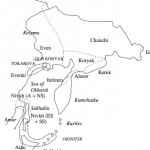
Nivkh and Chukotko-Kamchatkan Linguistic Relationship and Its Genetic Correlates
Lingua Vol. 8, Issue 121, June 2011, 1359-1376 http://dx.doi.org/10.1016/j.lingua.2011.03.001 The Relationship of Nivkh to Chukotko-Kamchatkan Revisited Michael Fortescue With the availability today of reliable materials for comparing the languages that in the past have been lumped together under the rubric…
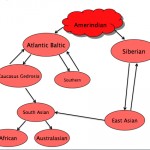
The Caucasus is the Americas of Western Eurasia: Intragroup-Genetic and Linguistic Diversity Are Inversely Correlated
Dienekes continues to refute himself and adopt my ideas. In his latest ADMIXTURE experiment he announces “The most salient point about this analysis is the central position of the Caucasus component vis-a-vis the others, consistent with my womb of nations…
An Abuse of Interdisciplinarity: Modeling the Indo-European Homeland Again
Science 2012, Vol. 337 no. 6097 pp. 957-960 doi: 10.1126/science.1219669 Mapping the Origins and Expansion of the Indo-European Language Family Remco Bouckaert, Philippe Lemey, Michael Dunn, Simon J. Greenhill, Alexander V. Alekseyenko, Alexei J. Drummond, Russell D. Gray, Marc A….
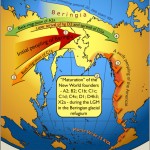
Dene-Yeniseian Language Family: Evidence for a Back-Migration to the Old World?
The 2012 Dene-Yeniseian Workshop took place on March 24 at the University of Alaska Fairbanks. Since the seminal presentation by the West Washington University linguist, Edward Vajda, of morphological and lexical evidence relating the small Yeniseian language family from Western…
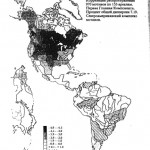
Comparative Mythology and the Study of Modern Human Origins
One of the main thrusts of this weblog is the need to test models of human origins and dispersals derived from paleobiology, archaeology and genetics using independent datasets pertaining to human language and culture, the defining characteristics of behavioral modernity….
On Sciences and Humanities: Reflections on Coyne and Konnikova
This post is seemingly off-topic on this blog. In reality, it goes to the core of the problems I’m trying to address. It just takes a philosophical and methodological road to get there. On Scientific American’s Literally Psyched blog, Maria…

mtDNA and Y-DNA Markers in South American Indians
Genetics and Molecular Biology 2012 Apr-Jun; 35 (2): 365-387. doi: 10.1590/S1415-47572012005000027. Uniparental Genetic Markers in South Amerindians Rafael Bisso-Machado, Maria C. Bortolini, and Francisco M. Salzano. A comprehensive review of uniparental systems in South Amerindians was undertaken. Variability in the…
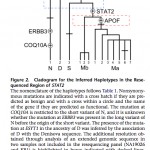
Archaic Introgression and the Derived Nature of African Lineages at STAT2 Gene
American Journal of Human Genetics 91, 2012, 265-274. http://dx.doi.org/10.1016/j.ajhg.2012.06.015. A Haplotype at STAT2 Introgressed from Neanderthals and Serves as a Candidate of Positive Selection in Papua New Guinea Fernando L. Mendez, Joseph C. Watkins, and Michael F. Hammer. Signals of…

Out-of-America Antecedents. I. William James Sidis
Out-of-America is a largely unique theory. But even the most unusual theory of all has antecedents. Steve Sailer asks “Didn’t William James Sidis have some kind of Out-of-America theory 90 years ago?” I hereby announce a new theme on this…
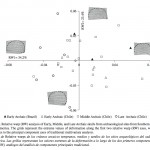
Ancient Molecular and Morphometric Variation from Chile: The Death of the Dual-Entry Model?
Chungara, Revista de Antropología Chilena Vol. 43, No 2, 2011, pp. 283-292 Morphometric and mtDNA Analyses of Archaic Skeletal Remains from Southwestern South America Germán Manríquez, Mauricio Moraga, Calogero Santoro, Eugenio Aspillaga, Bernardo T. Arriaza, and Francisco Rothhammer. For decades…
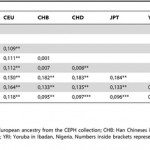
The Xavante Indians and Genetic Divergence Between American Indians and Africans
PLoS ONE 7 (8): e42702. doi:10.1371/journal.pone.0042702 Genome-Wide Analysis in Brazilian Xavante Indians Reveals Low Degree of Admixture Patricia C. Kuhn, Andréa R. V. Russo. Horimoto, José Maurício Sanches, João Paulo B. Vieira Filho, Luciana Franco, Amaury Dal Fabbro, Laercio Joel…
Morgan in the Mind: Anthropology’s Amnesia and Biology’s Patriotism
PLoS Biol 9 (7) 2011: e1001109. doi:10.1371/journal.pbio.1001109. Darwin in the Mind: New Opportunities for Evolutionary Psychology Bolhuis, Johan J., Gillian R. Brown, Robert C. Richardson, Kevin N. Laland. Evolutionary Psychology (EP) views the human mind as organized into many modules,…
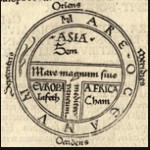
The World Without the West: Out-of-America Theory and Eurocentric Cosmologies
A revolution of the magnitude promised by the out-of-America theory of human origins requires a historiographic analysis. We need to understand how come science erred to the degree it did by focusing so exclusively and parochially on Old World centers…
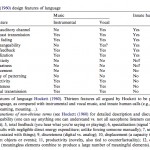
The Evolution of Language and Music
Cognition 100 (2006): 173-215 http://dx.doi.org/10.1016/j.cognition.2005.11.009 The Biology and Evolution of Music: A Comparative Perspective Fitch, W. Tecumseh. Studies of the biology of music (as of language) are highly interdisciplinary and demand the integration of diverse strands of evidence. In this…
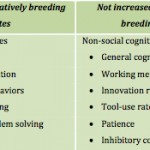
The Timing of the “Symbolic Revolution” in Modern Humans
Dienekes did everyone a favor by posting videos of talks by two famous Bay Area professors, one from Henry Gilbert on Homo erectus, the other one from Richard Klein on the “symbolic revolution” in modern humans. Both talks were delivered…
Web Gems: August 3, 2012
This is a new post genre on this weblog. “Web Gems” will feature smart thinking from the Comments sections of various other blogs followed by my no less bright commentary. This week I have three good ones: Andrew Oh-Willeke surprised…
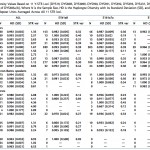
Genetics and Linguistics of the Bantu Expansion
Proc. Roy. Soc. Lond. B 279: 3256-3263. doi: 10.1098/rspb.2012.0318 Bringing Together Linguistic and Genetic Evidence to Test the Bantu Expansion De Filippo, Cesare, Koen Bostoen, Mark Stoneking, and Brigitte Pakendorf. The expansion of Bantu languages represents one of the most momentous…
On Dziebel, Out-of-America, and Anthropology: Response to Razib Khan
Razib Khan has reacted to my frequent bludgeoning of him. Here are a few quick rejoinders to set the record straight. But there will be no more follow ups. This blog is not about bickering. 1. On Dziebel‘s style Razib…
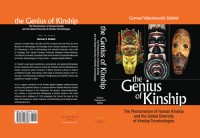
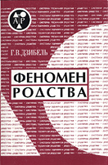
Recent Comments